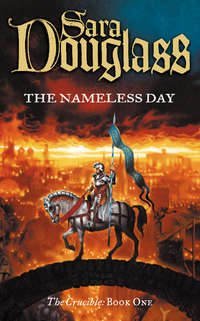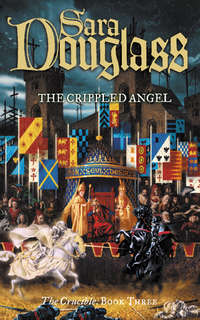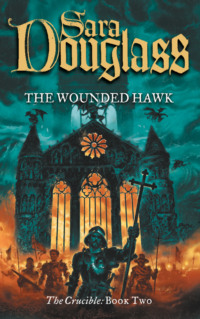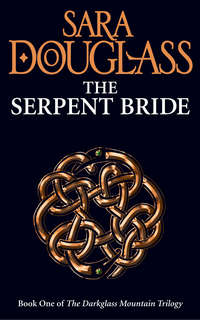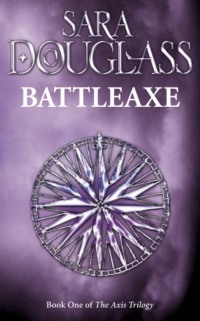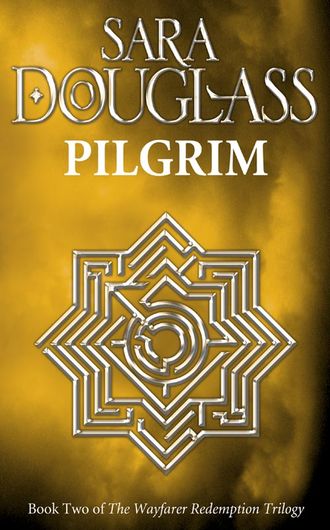
Полная версия
Pilgrim
She continued to snap and snarl, as if she had the rabid fever of wild dogs, scurrying from spot to spot, picking up a knuckle here, a vertebrae there, a cracked femur bone from somewhere else.
The pile of bones grew.
“I want to hunt,” she whispered, “and yet what must I do? Find your useless framework, and knit something out of it! Why must I be left to do it all?”
She finally stood, surveying the skeletal pile before her. “Something is missing,” she mumbled, and swept her hands back through her hair, combing it out of her eyes.
Her tongue had long since licked clean the tasty morsel draining down her chin.
“Missing,” she continued to mumble, wandering in circles about the desolate site. “Missing … where … where … ah!”
She snatched at a long white hair that clung to the outer reaches of the thorn bush and hurried back to the pile of bones with it. She carefully laid it across the top.
Then she stood back, standing very still, her dark blue eyes staring at the bones.
Very slowly she raised her left hand, and the circle of light about its ring finger flared.
“Of what use is bone to me?” she whispered. “I need flesh!”
She dropped her hand, and the light flared from ring to bones.
The pile burst into flame.
Without fear the woman stepped close and reached into the conflagration with both hands. She grabbed hold of something, grunted with effort, then finally, gradually, hauled it free.
Her own shape changed slightly during her efforts, as if her muscles had to rearrange themselves to manage to drag the large object free of the fire, and in the flickering light she seemed something far larger and bulkier than human, and more dangerous. Yet when she finally stood straight again, she had regained her womanly features.
She looked happily at the result of her endeavour. Her magic had not dimmed in these past hours! But she shook her head slightly. Look what had become of him!
He stood, limbs akimbo, pot belly drooping, and he returned her scrutiny blankly, no gratitude in his face at all.
“You are of this land,” she said, “and there is still service it demands of you. Go south, and wait.”
He stared, unblinking, uncaring, and then he gave a mighty yawn. The languor of death had not yet left him, and all he wanted to do was to sleep.
“Oh!” she said, irritated. “Go!”
She waved her hand again, the light flared, and when it had died, she stood alone in the stony gully of the Urqhart Hills.
Grinning again at the pleasantness of solitude, she turned and ran for the north, and as she did so her shape changed, and her limbs loped, and her tongue hung red from her mouth, and she felt the need to sink her teeth into the back of prey, very, very soon.
Scrawny limbs trembling, pot belly hanging from gaunt ribs, he stood on the plain just north of the Rhaetian Hills.
Beside him the Nordra roared.
He was desperate for sleep, and so he hung his head, and he dreamed.
He dreamed. He dreamed of days so far distant he did not know if they were memory or myth. He dreamed of great battles, defeats and victories both, and he dreamed of the one who had loved him, and who he’d loved beyond expression. Then he’d been crippled, and the one who loved him had shown him the door, and so he’d wandered disconsolate — save for the odd loving the boy showed him — until his life had trickled to a conclusion in blessed, blessed death.
Then why was he back?
3 The Feathered Lizard
Faraday kept her arm tight about the man as they walked towards where she’d left Zenith and the donkeys. He’d grown tired in the past hour, as if the effort of surviving the Star Gate and then watching the effects of the Demons flow over the land, had finally exhausted him both physically and mentally.
Faraday did not feel much better. This past day had drained her: fighting to repel the horror of the Demons’ passage through the Star Gate and fighting to save Drago from the collapsing chamber, then emerging from the tunnel to find Tencendor wrapped in such horrific despair, had left its mark on her soul. For hours she’d had to fight off the bleak certainty that there was nothing anyone could do against the TimeKeepers.
“Drago,” she murmured. “Just a little further. See? There is Zenith!”
Zenith, who had been waiting with growing anxiety, ran forward from where she’d been pacing by the cart. A corner of her cloak caught in the exposed root of a tree, and she ripped it free in her haste.
“Faraday! Drago! Drago?” Zenith wrapped her arms about her brother, taking the load from Faraday. “Is he all right, Faraday? And you … you look dreadful!”
The staff Drago had been clutching now fell from his fingers and rolled a few paces away.
“He needs some rest,” Faraday said. She tried to smile, and failed. “We both do.”
Zenith looked between both of them. Her relief that Faraday was well, and had managed to ensure Drago’s safe return, was overwhelmed by her concern at how debilitated both were. Drago was a heavy weight in her arms, his eyes closed, his breathing shallow, while the only colour in Faraday’s ashen face were the rings of exhaustion under her eyes. She had clasped her arms about herself in an effort to stop them shaking.
What happened? Zenith longed to ask.
“The cart,” she said, and half-dragged, half-lifted Drago towards it.
“Let me help,” Faraday said, and took the weight of his legs.
Between them they managed to lift Drago into the tray of the cart, then Zenith helped Faraday in.
“Sleep,” she said, pulling a blanket over them. “Sleep.”
Drago and Faraday shared the bed of the cart, and shared the sleep of the exhausted; and they shared a dream, although neither would remember it when they woke.
But over the next few days, as they wandered the forest, the scent of a flowering bush occasionally made one or the other lift a head and pause, and fight for the memory the scent evoked.
Zenith watched them for a long time. She was torn between relief at their return — thank the Stars Drago was alive! — and concern for both Faraday and Drago’s state. What both had endured, either with the Demons, or within the Star Gate Chamber itself, must have been close to unbearable. Even though she had been protected by the trees of Minstrelsea, Zenith had felt a trickle of the despair that had overwhelmed Tencendor when the Demons had broken through, and she could only imagine what Faraday had gone through so close to the Star Gate.
But Faraday and Drago were not Zenith’s only concerns. She wished she knew what had happened to StarDrifter. He’d been at the Star Gate towards the end, trying to help her parents to ward it against the Demons.
Would she see him again?
It didn’t occur to Zenith that she hardly thought about her parents. Now that she knew Faraday and Drago were safe, she needed to know that StarDrifter was as well. To think that he was dead … or somehow under the Demons’ thrall …
Zenith shivered and pulled her cloak closer about her. She could feel how deeply disturbed the forest was … were the Demons secreted within its trees? Were they even now creeping closer to where Zenith stood watch over Faraday and Drago?
Zenith’s head jerked at a movement in the shadows. Something was there … something … There was another movement, more distinct this time, and Zenith felt her chest constrict in horror. There! Something lurking behind the ghost oak.
She stumbled toward the donkeys’ heads, thinking to try and pull them forward, get herself and her sleeping companions away from whatever it was … escape … but when she tugged at the nearest donkey’s halter it refused to budge.
“Damn you!” Zenith hissed, and leaned all her weight into the effort. Why in the world did Faraday travel with these obstinate creatures when she could have chosen a well-trained and obliging horse?
Zenith tugged again, and wondered if she should take a stick to the damned creatures.
The donkey snorted irritably and yanked her head out of Zenith’s grasp.
Just as Zenith again reached for the halter, something emerged from the gloom behind the nearest tree.
Zenith’s heart lurched. She dropped her hand, stared about for a stick that she could defend Faraday and Drago with … and then breathed a sigh of relief, wiping trembling hands down her robe.
It was just one of the fey creatures of the forest, no doubt so disturbed by the presence of the Demons that it cared not that it wandered so close to Zenith and the donkeys.
It was a strange mixture of lizard and bird. About the size of a small dog, it had the body of a large iguana, covered with bright blue body feathers, and with a vivid emerald and scarlet crest. It had impossibly deep black eyes that absorbed the light about it. What it used the light for Zenith could not say, perhaps as food, but once absorbed, the lizard apparently channelled the light through some furnace within its body, for it re-emerged from its diamond-like talons in glinting shafts that shimmered about the forest.
Zenith smiled, for the feathered lizard was a thing of great beauty.
Watching Zenith carefully, the lizard crawled the distance between the tree and the cart, giving both donkeys and Zenith a wide berth. It sniffed briefly about the wheels of the cart, then, in an abrupt movement, jumped into the tray.
Zenith moved very slowly so she could see what the lizard was doing — and then stopped, stunned.
The lizard was sitting close to Drago’s head, gently running its talons through his loose hair, almost … almost as if it were combing it, or weaving a cradle of light about his head.
Zenith was vividly reminded of the way the courtyard cats in Sigholt had taken every opportunity they could to snuggle up to Drago.
Zenith’s eyes widened, and suddenly the lizard decided to take exception to her presence. It narrowed its eyes and hissed at her, then leaped to the ground and scuttled away into the trees.
Zenith stared at the place where it had disappeared, then looked back to Drago. She smoothed the loose strands of his coppery hair (was it brighter now than it had been previously?) away from his face, studying him carefully. He looked the same — and yet different. His face was still thin and lined, but the lines were stronger, more clearly defined, as if they had been created through purpose rather than through resentment and bitterness. And even though he was asleep, there was a strange “quiet” about him. It was the only way Zenith could describe it to herself. A quiet that in itself gave purpose — and hope.
His eyelids flickered open at her touch, and his mouth moved as if to smile.
But he was clearly too exhausted even for that effort.
“Zenith,” he whispered. “Are you well?”
Zenith’s eyes filled with tears. Had he been worried for her all this time? The last time he’d seen her had been in Niah’s Grove in the far north of the forest, battling the Niah-soul within her.
She smiled, and took his hand. “I am well,” she said. “Go back to sleep.”
Now his mouth did flicker in a faint smile, but his eyes were closed and he was asleep again even before it faded.
Zenith stood and watched him for some time, cradling his hand gently in hers, then she looked at Faraday. The woman was deeply asleep, peaceful and unmoving, and Zenith finally set down Drago’s hand and moved away from the cart.
Unsure what to do, and unsettled by the continuing agitation she could feel from the trees, Zenith remembered the staff that Drago had dropped. She walked about until she found where it had rolled, and she picked it up, studying it curiously.
It was made of a beautiful deep red wood that felt warm in her hands. It was intricately carved in a pattern that Zenith could not understand. There was a line of characters that wound about the entire length of the staff, strange characters, made up of what appeared to be small black circles with short hooked lines attached to them.
The top of the staff was curled over like a shepherd’s crook, but the knob was carved into the shape of a lily.
Zenith had never seen anything like it. She hefted the staff, and laid it down next to Drago.
Then she sighed and walked away, sitting down under a tree. She let her thoughts meander until they became loose and meaningless, and her head drooped in sleep.
She dreamed she was falling through the sky, but in the instant before she hit the ground StarDrifter was there, laughing, his arms held out for her.
I will always be there to catch you, I’ll always be there for you.
And Zenith smiled, and dreamed on.
A hand touched her shoulder, and Zenith awoke with a start.
It was Faraday, looking well and rested.
“Faraday?” Zenith said. “How are you? Is Drago still in the cart? What happened at —”
“Shush,” Faraday said, and sat down beside Zenith. “I have slept the night through, and Drago still sleeps. Now,” she took a deep breath, and her body tensed, “let me tell you what happened in the Chamber of the Star Gate.”
Zenith sat quietly, listening to the horror of the emergence of the children — but children no longer, more like birds — and of StarLaughter and the undead child she carried, and then of the appalling evil of the Demons.
“Oh, Zenith,” Faraday said in a voice barely above a whisper. “They were more than dreadful. Anyone caught outside of shelter during the times when they hunt will suffer an appalling death — and a worse life if they are spared death.”
She stopped, and took Zenith’s hand, unable to look her in the face.
“Zenith, the Demons destroyed the Star Gate.”
Zenith stared at Faraday, for a moment unable to comprehend the enormity of what she’d just heard.
“Destroyed the Star Gate?” she repeated, frowning. “But they can’t. I mean … that would mean …”
Zenith trailed off. If the Star Gate was destroyed that would mean the sound of the Star Dance would never filter through Tencendor, even if the TimeKeeper Demons could be stopped.
“No,” Zenith said. “I cannot believe that. The Star Gate can’t be destroyed. It can’t. It can’t!”
Faraday was weeping now. “I’m sorry, Zenith. I …”
Zenith grabbed at her, hugging her tight, and now both wept. Although Zenith had known that the approach of the Demons meant that the Star Dance would be blocked, she had not even imagined that the Demons would actually destroy the Star Gate on their way through.
There was not even a hope for the Dance to ever resume.
“Our entire lives without the Dance?” Zenith whispered. “Even if we can best these Demons, we will never again have the Star Dance?”
Faraday wiped her eyes and sat up straight. “I don’t know, Zenith. I just don’t.”
“Faraday … did you see StarDrifter at the Star Gate?”
“No. I am sorry, Zenith. I don’t know where he is … but I am sure he is safe.”
“Oh.” Zenith’s face went expressionless for a moment. “And the Sceptre?” she finally said.
“That, at least, is safe.” Faraday looked back to the cart. “But transformed, as is everything that comes through the Star Gate. Come. It is time to wake Drago up. There are some clothes for him in the box under the seat of the cart, and we all need to eat.”
“And then?”
“Then we go find Zared, make sure he is well.”
“And then?”
Faraday smiled, and stood, holding out her hand for Zenith. “And then we begin to search for a hope. Come.”
Despair and then, as night settled upon the land, terror swept over Tencendor, but it left him unscathed. He was lost in his dreams, and the Demons could not touch him. He shuffled from leg to leg, trying to ease his arthritic weight, but none of it helped. He wished death would come back and take him once more.
His head drooped. He’d thought to have escaped both the sadnesses of life and the crippling pains of the body. If he hoped hard enough, would death come back?
4 What To Do?
The might of Tencendor’s once proud army now stood in groups of five or six under the trees of the northern Silent Woman Woods, eyes shifting nervously. Some members of the Icarii Strike Force preferred to huddle in the lower branches of the trees, as if that way they could be slightly closer to the stars they had lost contact with. Thirty thousand men and Icarii adrift in a world they no longer understood.
Their leader, StarSon Caelum, walked slowly about, the fingers of one hand rubbing at his chin and cheek, his eyes sliding away from the fear in his men’s faces, thinking that now he knew how Drago must have felt when his Icarii powers had been quashed.
There was nothing left. No Star Dance. No enchantment. Nothing. Just an emptiness. And a sense of uselessness so profound that Caelum thought he would go mad if he had to live beyond a day with it.
“Faraday said she would join us here,” Zared said, watching Caelum pace to and fro. He sat on a log, his hands dangling down between his knees, his face impassive.
“And you think she can help us against this … this …?” Caelum drifted to a halt, not sure quite what to call this calamity that had enveloped them.
“Can you?”
Caelum spun about on his heel and walked a few paces away.
“We can do little, Caelum, until we hear from Faraday.”
“Or my parents.”
“Or your parents,” Zared agreed. He paused, watching Caelum pace about. He did not care for the loss that Caelum — and every other Enchanter — had suffered. They relied so deeply on their powers and their beloved Star Dance, that Zared did not know if they could continue to function effectively without it. Caelum was StarSon, the man who must pull them through this crisis — but could he do it if he was essentially not the same man he had been a few weeks ago? How could anyone who had previously relied on the Star Dance remain effective?
Maybe Axis. Axis had been BattleAxe, and a good BattleAxe, for years before he’d known anything about the Star Dance.
And yet hadn’t Axis said that even when he’d thought himself human, mortal, he’d still subconsciously drawn on the Star Dance? Still used its power and aid?
Well, time would tell if Icarii blood was worth anything without the music of the Star Dance.
At the moment, Zared had his doubts. He would gladly trade Tencendor’s entire stock of useless Enchanters and SunSoars for the hope Faraday offered.
Suddenly sick of watching Caelum pacing uselessly to and fro, Zared stood and walked over to where Herme, Theod, DareWing FullHeart and Leagh were engaged in a lacklustre game of ghemt.
Leagh looked up and smiled for him as he approached, and Zared squatted down by her, a hand on her shoulder.
“How goes it, Leagh?”
“She wins,” Herme replied, “for how can we,” his hand indicated his two companions, “allow such a beautiful woman to lose?”
Leagh grinned. “My ‘beauty’ has nothing to do with the fact, my good Earl Herme, that I am far more skilled than you.”
All the men laughed, and threw their gaming sticks into the centre of the circle scratched into the dirt before them.
Zared touched Leagh’s cheek softly, then looked to DareWing. “My friend, I wonder if I might ask something of you?”
The Strike Leader inclined his head. “Speak.”
“Faraday told us that there were certain times of the day when it would be dangerous to go outside, times when the Demons would spread their evil. DareWing, I need to know when exactly these times are.”
“Dawn, dusk, mid-morning and mid-afternoon, and night,” Theod said. “This we know.”
“Yes, but we need to know more specifically. If we know exactly when it is safe for us to roam abroad, then we will have a better idea of how to counter these Demons … or at least, when we can try to do so. Besides, somehow we will have to rebuild life around,” he paused, his mouth working as if he chewed something distasteful, “our new-found restrictions. We need to know when it is safe to live.”
DareWing nodded. “I agree … but how?”
“Can you station members of your Strike Force, perhaps twenty at any one time, along the south-west borders of the Silent Woman Woods? They will be safe enough if they remain among the trees, and perhaps they can observe … observe the behaviour of those still trapped in the open.”
DareWing nodded, agreeing with the location. The south-west border of the Woods would be close to Tare, an area more highly populated than the northern or southern borders of the Woods. If they needed to observe, that would give them their best possible chance.
“The more we learn,” he said, “the more hope we have.”
“You do not want any of our men stationed there?” Herme asked quietly.
“My friend,” Zared said. “I ask only the Icarii because they can move between the border and back to our placement faster than can human or horse legs.” He stood up. “I profess myself sick at not knowing how to react, or what to do next. Until Faraday returns we must do what we can.”
DareWing rose to his feet, nodded at Zared, and faded into the gloom of the forest.
Fifteen paces away Askam sat with his back against a small sapling, his eyes narrow and unreadable as he watched Zared move to talk quietly with Caelum.
His mouth thinned as he saw Caelum nod at Zared’s words and place a hand briefly on the King’s shoulder.
After three days of observation, they had a better idea of the span of the Demonic Hours. From dusk to the time when the sun was well above the horizon was a time of horror, the time when first Raspu, then Rox and finally Mot ruled the land. Pestilence, terror and hunger roamed, and those few who were caught outside succumbed to the infection of whichever Demon had caught them. After the dawn hour there were three hours of peace, a time of recovery, before Barzula, tempest, struck at mid-morning.
Although the occasional storm rolled across the landscape during Barzula’s time — whirlwinds of ice or of fire — the scouts reported that the primary influence of the tempest appeared to occur within the minds of those caught outside. Once Barzula’s hour had passed and he had fed, there was again a time of peace (or, rather, a time of frightful anticipation) for some four hours until Sheol struck at mid-afternoon. Again, an interval of three hours when it was safe to venture outside, then the long hours of pestilence and terror through dusk and night.
The precise time span of the Demonic Hours were marked by a thin grey haze that slid over the land from a point to the east, probably the location of the Demons themselves. It was a sickening miasma that carried the demonic contagion with it, lying over the land in a drifting curtain of madness until it dissipated at the end of the appointed time.
“And those caught outside?” Zared asked softly of the first group of scouts to report back.
“Some die,” one of the scouts said, “but most live, although their horror is dreadful to watch.”
“Live?”
The scout took a moment to answer. “They live,” he finally said, “but in a state of madness. Sometimes they eat dirt, or chew on their own excrement. I have seen some try to couple with boulders, and others stuff pebbles into every orifice they can find until their bodies burst. But many who live past their first infection — and those dangerous few hours post-infection when they might kill themselves in their madness — wander westwards, sometimes north-west.”
The scout paused again, locking eyes with his fellows. Then he turned back to Zared and Caelum. “It is as if they have been infused with a purpose.”
At that Zared had shuddered. A purpose? To what end? What were the Demons planning?
But the scouts had yet more to report. One group had also seen seven black shapes running eastwards across the Plains of Tare towards the Ancient Barrows. Horses they thought, but were not sure. Above them had flown a great dark cloud … that whispered.


